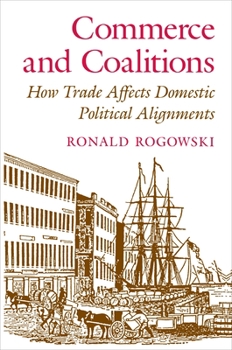Commerce and Coalitions: How Trade Affects Domestic Political Alignments
Select Format
Select Condition 
Book Overview
Why do countries differ so greatly in their patterns of political cleavage and coalition? Extending some basic findings of economic theories of international trade, Ronald Rogowski suggests a... This description may be from another edition of this product.
Format:Paperback
Language:English
ISBN:0691023301
ISBN13:9780691023304
Release Date:May 1990
Publisher:Princeton University Press
Length:232 Pages
Weight:0.77 lbs.
Dimensions:0.6" x 6.1" x 9.2"
Customer Reviews
1 rating
Explaining a Lot with a Little: Trade and Domestic Politics
Published by Thriftbooks.com User , 20 years ago
Peter Gourevitch ended his famous 1978 "Second Image Reversed" article with a call for analysts to conduct more work on how the international system affects domestic political coalitions and their struggle for power. Perhaps the most important work that arose out of Gourevitch's call to coalition analysis was Rogowski's "Commerce and Coalitions" (1989), which parsimoniously and elegantly engaged both the second-image reversed literature and the literature on domestic coalitions. Rogowski responds to work that had previously looked at domestic coalition (cleavage) formation, without considering international trade, such as Lipset and Rokkan (1967) and Moore (1967). In line with the second-image reversed argument, Rogowski instead uses the Stolper-Samuelson theorem to explain domestic cleavages. Briefly, the S-S theorem says that trade will benefit the abundant factor(s) (land, labor and/or capital) in each country, and harm the scarce factor(s). Rogowski draws a political implication from this theorem, which is that the benefited group will gain more political power by way of economic leverage and strategic incentives. More specifically, Rogowski's model can predict either an urban-rural conflict or a class conflict. In the first case, land is the abundant factor which would benefit. Capital and labor, normally based in an urban environment, are scarce and would go on the defensive. In the latter case, the economy is endowed in labor, and capital and land are scarce, thus leading to an assertive coalition of landowners and capitalists. But there are two key problems with this type of second-image reversed coalition analysis. The first is that outcomes are under-specified and ambiguous, and the second is that process-tracing is nearly absent. For Rogowski, outcomes are in fact blatantly under-specified, because Rogowski does not actually predict outcomes! He admits as much when he writes that "winners can expand their political influence" (4 - note the hedging by the use of the term "can" instead of "will"), and "as the desire and the means for a particular political preference increase, the likelihood grows that political entrepreneurs will devise mechanisms that can surmount the obstacles to collective action" (5). Not only are we faced with this ambiguous, probabilistic argument, but we are also told that those harmed by free trade will demand "protection or imperialism" (5), but we are not told which one, and under what circumstances. Further, Rogowski admits that "winners" who are strengthened politically might still lose, without telling us cases or conditions under which they would do so. "Victory or defeat depends, so far as I can see, both on the relative size of the various groups and on those institutional and cultural factors that this perspective so resolutely ignores" (20). Process-tracing is also absent from Rogowski's analysis, because there is little empirical evidence of his hypothesized effects at work. In effec






